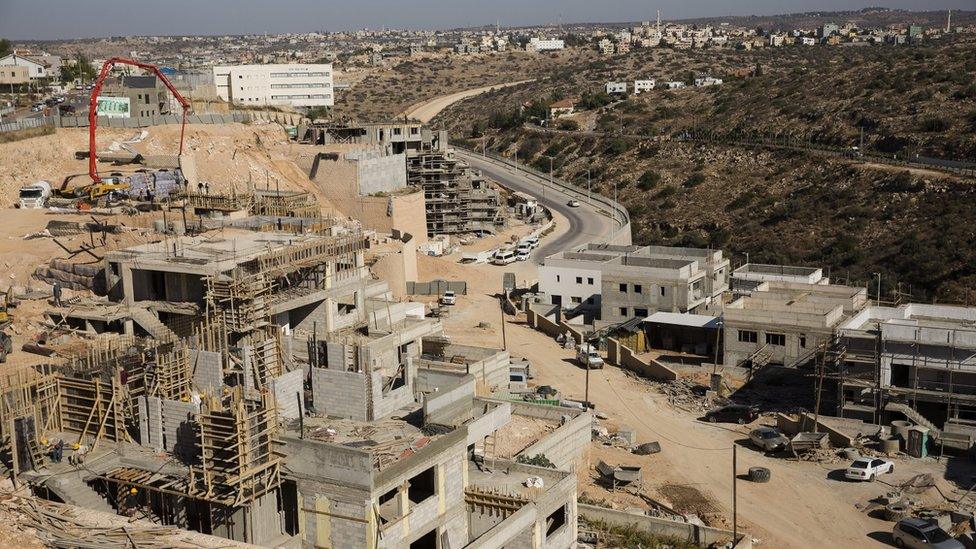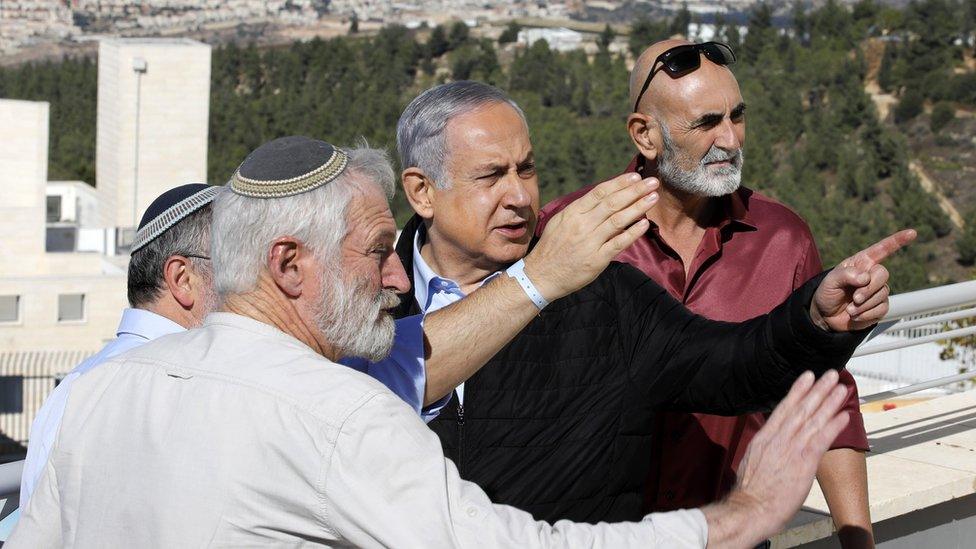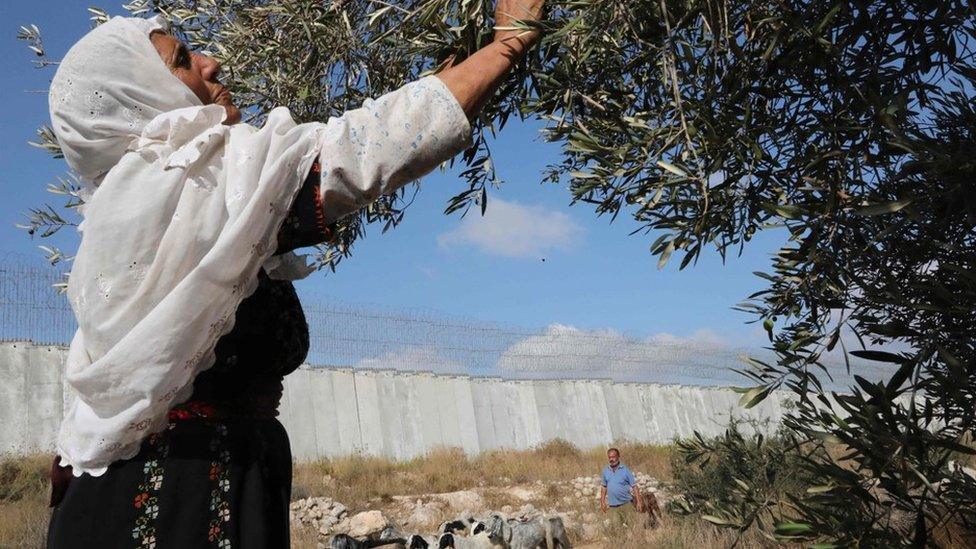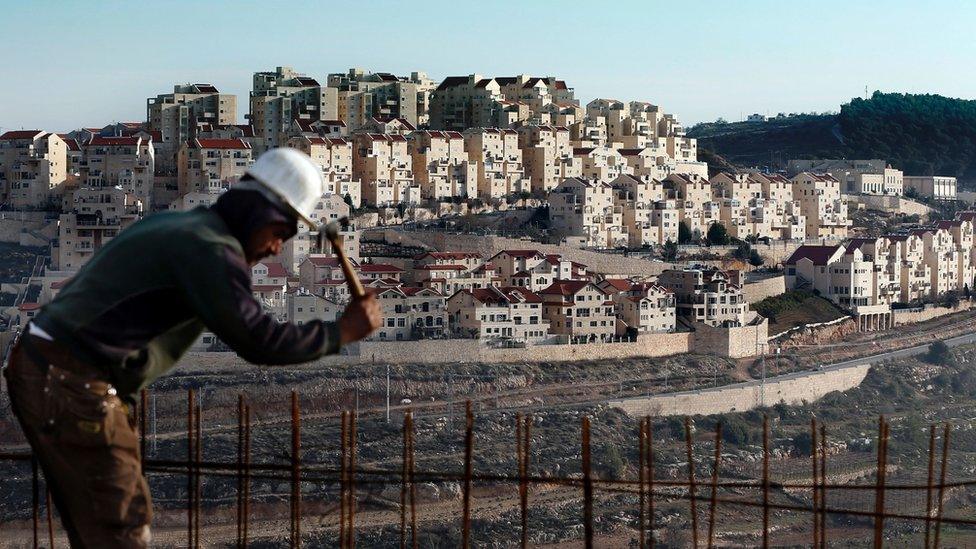US settlement move reduces chances of Israeli-Palestinian peace deal
- Published

The issue of Jewish settlements is a major source of dispute between Israel and the Palestinians
The US policy shift on Jewish settlements in the occupied West Bank makes no difference from a legal point of view.
The Trump administration can declare that the settlements are "not per se inconsistent with international law", as Secretary of State Mike Pompeo did on Monday.
But Americans do not make international law: that is up to bodies such as the United Nations and treaties such as the Fourth Geneva Convention, which bars an occupying power from transferring parts of its civilian population to occupied territory.
The US decision does, however, make a difference from a political point of view, giving a boost to Israel's position that the West Bank is "disputed" rather than "occupied". And it decreases even further the chances of a negotiated peace deal between Israel and the Palestinians.
Watch Mike Pompeo explain the shift in the US position
Settlements are Jewish communities built on territory occupied by Israel during the 1967 Middle East war. Negotiations within the framework of the 1993 Oslo Peace Accords aimed to establish a Palestinian state in the West Bank, East Jerusalem and the Gaza Strip. But Oslo did not forbid the building of settlements and every Israeli government since 1993 has continued doing so.
Previous US administrations opposed settlement construction as an obstacle to peace, and tried to limit it to varying degrees. But planning and building have accelerated under the Trump administration, according to the Israeli anti-settlement monitoring group Peace Now.
The policy shift has been strongly supported by the US envoy to Israel, David Friedman, who raised funds for settlements before becoming an ambassador.
The possibility is that this change could green-light steps towards annexation of Palestinian territory. That is the demand of Israel's national religious right, a core constituency of Prime Minister Benjamin Netanyahu, which sees the West Bank as part of a historic Jewish homeland.
Mr Netanyahu has made election promises to annex parts of the West Bank, and described a pending peace plan drafted by the Trump administration as a road map for extending "Jewish sovereignty".

Israeli Prime Minister Benjamin Netanyahu (centre) said the US move "rights a historical wrong"
That proposal has yet to be rolled out. Mr Pompeo said removing the peace process from arguments about who was right or wrong under international law would create political space for the administration's "vision", although he did not provide any details.
Whether or not that is the case, it creates problems for the rest of the world, which has been operating under an internationally accepted framework for Israeli-Palestinian peace.
The international community has focused for more than two decades on working towards a two-state solution. The European Union and United Nations have been warning that Jewish settlements are eroding that possibility. Now that a main player has withdrawn opposition, the way forward is even less clear: there is no Plan B.
Israelis and Palestinians react to the US decision to shift its policy on West Bank settlements
America's Arab allies also find it increasingly difficult to support President Trump's peace efforts, as they are reluctant to be associated with US decisions considered so pro-Israel.
And the decision on settlements is a problem for the American Jewish community, because it further deepens the partisan divide on Israel.
Republican lawmakers praised the policy shift, but some Democrats strongly denounced it, including presidential candidates.
Such clear differences no doubt influenced the cautious response from even the most powerful pro-Israel lobby group in Washington, Aipac, which tweeted that it did not take a position on settlements.

Palestinians denounced the US move as a dangerous violation of international law
Palestinians do not have many options.
They have has been boycotting President Trump's peace efforts since his 2017 decision to recognize Jerusalem as Israel's capital, the eastern part of which Palestinians want to be the capital of a future state.
The Palestinian leadership is divided between the Palestinian Authority led by President Mahmoud Abbas and his Fatah movement in the West Bank, and the Islamist Hamas movement in Gaza. That schism has prevented the development of an effective strategy to confront the Trump administration as it has changed US policy on Israel and the Palestinian territories.
The people are weary of protests. Palestinian militants have described the US shift as the funeral of the Oslo peace process, and called for resisting the occupation.
But many Palestinians seem to have adopted a war of position. They say that simply staying on the land is a form of non-violent resistance.


- Published18 November 2019
